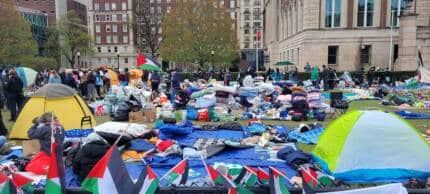
We are civil society organisations, grassroots groups, coalitions, individuals, and networks in Europe working to address the climate, social and environmental crises.
In the last few weeks, building on widespread demonstrations of solidarity around the world, starting in North America and spreading into Europe and beyond, we have witnessed escalating protests on university grounds. Students have shown up in support of an urgent end to the Israeli government’s continued assault on the Gaza strip, and to denounce the complicity of European governments and institutions.
While some university occupations and encampments have been able to move forward without impediment (and in some cases have achieved their objectives), in other instances the university administration as well as local or state authorities have chosen the route of repression over the one of dialogue. Episodes of violence by police and private security forces, as well as by counter-protestors, have forcefully attempted to silence those voices speaking out for peace and justice.
This is just the latest signal in a worrying trend which has seen our governments across Europe take action to criminalise protest and reduce the space for civil society to exert pressure on decision-makers. Originating and more harshly carried out on people of colour and Muslim people, we have experienced that repression and criminalisation across different social movements as well, including over the last few years in the climate movement. Pre-emptive arrests, increased surveillance, harsher sentencing, and inflammatory rhetoric that stokes public division and incites abuse have dramatically increased the cost of taking action.
We praise the bravery of students, protestors, and Palestinian allies in taking on significant risk to themselves and to their futures, in order to stand up for what’s right. We recognise the extraordinarily higher risks people in Gaza are facing on a daily basis.
Since the October 7 massacre, over the last eight months, according to the United Nations, more than 34,500 people have been killed in Gaza. International institutions, including the International Court of Justice, have recognised reasonable grounds for, and risk of, genocide, while human rights organisations including Human Rights Watch and Amnesty International have condemned Israeli military actions in Gaza as amounting to war crimes. From an environmental perspective, the impacts of the devastation in Gaza are profound, with the widespread destruction and pollution of air, soil and water making the area unlivable.
As organisations, individuals and activists involved in the broader struggle for climate justice and a more equal world, we stand in solidarity with non-violent student protests, with the people of Gaza and broader Palestine, and with all those who have lost or risk losing loved ones through the ongoing violence. We call for an immediate ceasefire, for an end to the occupation in line with UN resolutions, for the end of arms exports to the Israeli government, and for the respect of international humanitarian and human rights law – so that everyone, everywhere, can live in freedom and safety.
Given the urgency of the situation in Gaza, direct and urgent action is justified. We have seen students lean into their power before – throughout history, but most recently over the last decade, whether through the fossil fuel divestment movement, the Fridays For Future strikes, or the End Fossil occupations. In fact, students who are taking action today are building in continuity with this history, connecting the dots across climate and war, calling on their universities to divest from the fossil fuels that are wrecking our climate, as well as the arms manufacturers that are fueling widespread destruction – to divest from violence, in all of its forms. The same financial institutions that universities bank with or invest through, are responsible for funding the drones and weapons that have killed thousands of civilians in Gaza and the West Bank, as well as the oil and gas extraction which is exacerbating the environmental catastrophe Palestinians have been subject to through war.
The horrors of this war are being used to sow division, further proliferate anti-Arab racism, Islamophobia, as well as anti-semitism, and limit the right to protest. We can’t let that happen. Joining together as a strong, united climate and environmental movement within a broader movement for justice, enables us to build the power we need to help create a world of freedom, safety, and belonging for everyone.
Protest is at the core of movements’ work, and has been instrumental in securing many of the collective rights we have today and much of the progress we’ve been able to make in confronting our crises. Today, protest is an essential tool for putting an end to the unfolding atrocities, and today, protest is once again under threat.
We call on university administrations to choose the route of dialogue, supporting their students’ right to protest and engaging in conversations with them around their demands. We demand of our governments to terminate the draconian measures that are limiting our freedom of expression and our freedom to demonstrate, and to end funding and support of the ongoing onslaught in Gaza.
Signed by:
350.org
Action Justice Climat
Alofa Tuvalu
ATTAC
CCFD-Terre Solidaire
Ekō
Friends of the Earth England, Wales and Northern Ireland
Friends of the Earth Scotland
GreenFaith France
Greenpeace France
Greenpeace UK
Let Impactrices
Oil Change International
Platform
StopTotal
Does your organisation want to sign? You can do so here.
The post Student protests on Gaza: solidarity statement by climate movement groups appeared first on 350.